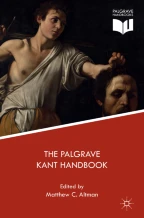
This chapter explains the basic positions in Kant’s political philosophy. The first section deals with the role of political philosophy within Kant’s philosophical system, its relation to metaphysics, and the connection between politics, law, and morality. The second section deals with Kant’s account of the social contract and the account of property relations grounded within it. The third section outlines Kant’s view of civil society and the state and the role of philosophy within both. The fourth section brings out the interrelationship between the various levels of law as seen by Kant: the national, the international, and the cosmopolitan.
This is a preview of subscription content, log in via an institution to check access.


“A faculty of choice, that is, is merely animal (arbitrium brutum) which cannot be determined other than through sensible impulses, i.e., pathologically. However, one which can be determined independently of sensory impulses, thus through motives that can only be represented by reason, is called free choice (arbitrium liberum)” (A802/B830).
He famously concludes that one can make this “generalization about men: they are ungrateful, fickle, liars and deceivers, they shun danger and are greedy for profit” (Niccolò Machiavelli, The Prince, trans. George Bull [Harmondsworth: Penguin, 1968], 96).
Allen W. Wood, Kant (Oxford: Blackwell, 2005), 108–9.For a valuable discussion of the question, see Sorin Baiasu, “Right’s Complex Relation to Ethics in Kant: The Limits of Independentism,” Kant-Studien 107, no. 1 (March 2016): 2–33.
Robert B. Louden, Kant’s Impure Ethics: From Rational Beings to Human Beings (New York: Oxford University Press, 2000).
Here I follow the useful discussion by Reinhard Hiltscher in Kant-Lexikon, vol. 1, ed. Marcus Willaschek et al. (Berlin: de Gruyter, 2015), 1–3.
See Allen Wood, “Kant’s Political Philosophy,” in The Palgrave Handbook of German Idealism, ed. Matthew C. Altman (London: Palgrave Macmillan, 2014), 172–73.
See Susan Meld Shell, The Embodiment of Reason: Kant on Spirit, Generation, and Community (Chicago: University of Chicago Press, 1996), 4–5, 81–82.
Howard Williams, Kant’s Critique of Hobbes: Sovereignty and Cosmopolitanism (Cardiff: University of Wales Press, 2003), 160–74.
See Susan Meld Shell, “Kant on Just War and ‘Unjust Enemies’: Reflections on a ‘Pleonasm,’” Kantian Review 10 (Jan. 2005): 82–111; and Brian Orend, War and International Justice: A Kantian Perspective (Waterloo: Wilfrid Laurier University Press, 2000).
Howard Williams, Kant and the End of War: A Critique of Just War Theory (Basingstoke: Palgrave Macmillan, 2012).